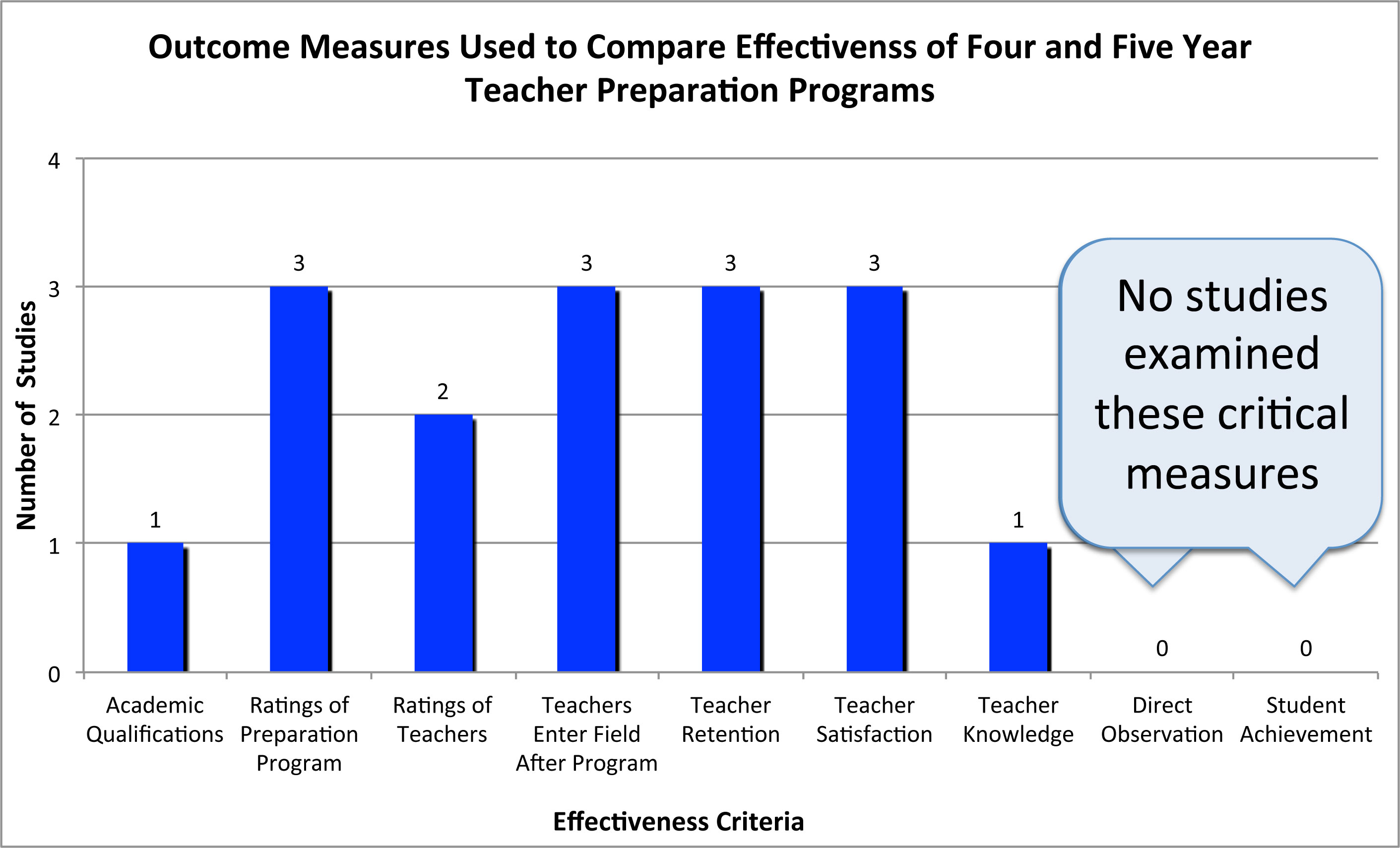What does current research tell us about the effect of four- and five-year teacher preparation programs on the quality of teachers and student achievement?
Why is this question important? The practice of increasing teacher preparation programs from four to five years has resulted in increased costs for the education of teachers as well as reduced numbers of qualified teachers. Given these added burdens to the system, do the benefits of the added year outweigh the costs?
See further discussion below.

Source(s): Studying Teacher Education: Chapter 11, Teacher Education Programs
Result(s): The five-year credential program model is a relatively modern concept that gained momentum in the 1960s. By the mid-1980s organizations such as the American Association of Colleges for Teacher Education and the Carnegie Forum on Education and the Economy were actively advocating five-year programs as a solution to unsatisfactory student achievement. Despite a lack of research on the topic, many teacher preparation standards, including the state of California, adopted the practice. It has been estimated that upward of 25% of American teachers receive credentials from post-baccalaureate programs.
To date, the most extensive research on the effectiveness of four- and five-year credential teacher programs has been conducted by Andrew (1990) and Andrew and Schwab (1995). These two studies reached similar findings. Unfortunately, this research did not examine student achievement or directly observe teacher performance but instead relied on less useful criteria and less rigorous methods such as surveys.
Andrew and Schwab found that five-year programs indicated better success for the selected effectiveness criteria used in the studies. The criteria they used were academic qualifications, self-rating of the teacher's preparation program, ratings of the teachers by supervisors, the number of teachers who went on to actually enter the field, retention, teacher satisfaction, and teacher knowledge of the field. However, those criteria are only indirect indicators of teacher effectiveness. The authors determined from the self-reports that there was evidence favoring 5-year programs over 4-year programs. The self-reports indicated that teachers from 5-year programs remained in teaching longer, had greater confidence in their teaching skills, ranked their programs better at preparing them for the classroom, and led to confidence in their ability to be leaders. Even the information relating to leadership was inconclusive as it was contradicted by the reports from principals. When principals assessed teacher competence and leadership, they rated four- and five-years teachers virtually the same.
Implication(s): The take-home message is that without examining student achievement, current research on the effectiveness of four- and five-year programs cannot answer the important question, do the benefits of five-year credential programs outweigh the costs? New studies should be conducted correlating each type of teacher preparation program with student achievement. These new studies need to employ rigorous research methods that can produce greater confidence in the results and conclusions of the research.
Author(s): Kenneth Zeichner and Hilary Conklin
Publisher(s): The American Research Association (AERA)
Study Description: (1) Studying Teacher Education: Chapter 11, Teacher Education Program: A report of the American Education Research Association (AERA) on Research and Teacher Education; and (2) Andrew and Schwab, 1995: Has Reform in Teacher Education Influenced Teacher Performance? An Outcome Assessment of Graduates of Eleven Teacher Education Programs. Graduates of the University of New Hampshire's four- and five-year programs over 10 years, in various grade levels as well as subject content, were assessed to determine effectiveness. Effectiveness was determined based upon yearly evaluation questionnaires.
Citation:
Andrew, M., and R. L. Schwab, 1995. Has Reform in Teacher Education Influenced Teacher Performance? An Outcome Assessment of Graduates of Eleven Teacher Education Programs. Action in Teacher Education, 17(3), 43-53.
Zeichner, K. M., and H. G. Conklin, 2005. Teachers Education Programs. In M. Cochran-Smith and K. M. Zeichner, Eds., Studying Teacher Education: The Report of the AERA Panel on Research and Teacher Education, Mahwah, NJ: Lawrence Erlbaum Associates.
